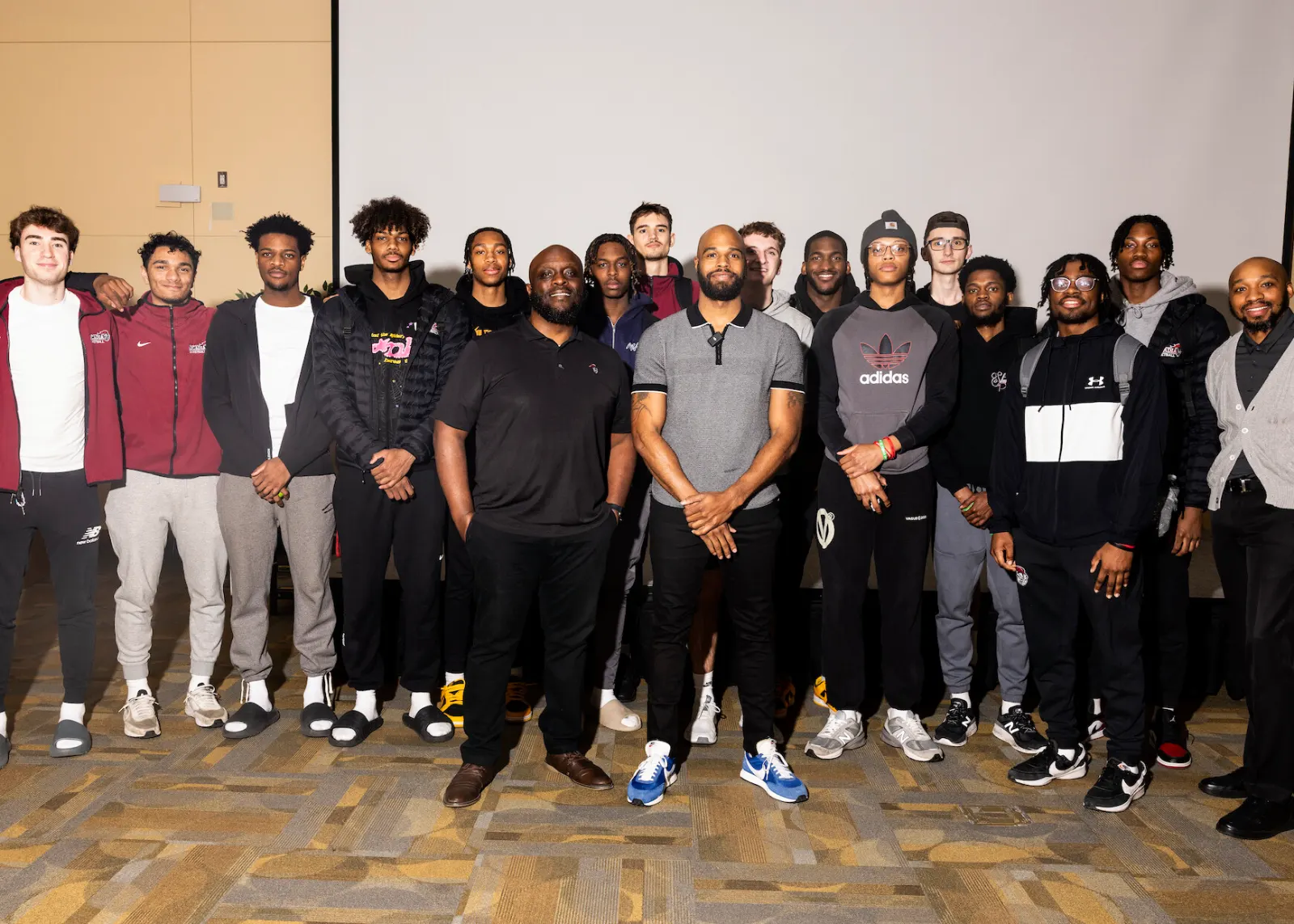Philly-born Mental Health Advocate, Nafis Ricks, Inspires Students to Take Care of Their Minds

Former Division 1 basketball player-turned-mental-health-advocate, Nafis Ricks, visited Arcadia on March 20 to meet with students, share his story, and help battle the stigma surrounding mental health among college students and athletes.
“How many of you believe in mental health?” he began, addressing an audience in the Commons Great Room. With every hand raised, he explained that that level of support for mental health was almost never present in his life. He then opened up about the struggles he’s faced and ended with a brief Q&A.
“I liked how he told his personal story,” said Charlotte Mallow ’27DPT, MPH, a former student-athlete. “It was very informative and helped me figure out more of what we can do going forward.”
“It’s good to have an event like this,” said Aoife Samuelson ’24, a Psychology major. “It’s good to have something that brings people together in support of a common goal that helps all students and student-athletes.”
Ricks started his story at the very beginning. He grew up in West Philadelphia as the middle child of three brothers. When he was young, his parents separated, which kept him from understanding how to be vulnerable.
“Growing up in Philadelphia you see a lot of trauma,” he said. “You see a lot of violence, gun violence, and eventually I was desensitized by it. I struggled mentally because I didn’t know how to articulate myself or talk about my struggles with my parents.”
Ricks played basketball for Robert E. Lamberton High School in Overbrook Park before attending Johnson County Community College in Kansas and ultimately earned a D1 scholarship to Missouri State University (MSU). By that time, both his brother and cousin had lost their lives to gun violence in Philadelphia.
“I felt immense survivor’s guilt,” said Ricks. “I made it out of my neighborhood but none of my family or friends made it with me. I felt like it was my fault that I couldn’t save them because I left the city. I carried that, and I still do.”
Ricks went on to play point guard for the Missouri State Bears and formed a strong connection with his coach, Cuonzo Martin, but he continued to struggle with his mental health.
“It got to a point where I thought about dropping out of college,” he said. “I was averaging seven points a game and riding the bench as a junior. I sat in my room every night and cried and thought about hurting myself. One night, I asked myself if it was all worth it.”
Ricks opened up to his coach and was set up with a psychologist by the end of the day. He met with his therapist daily, and over time he began to feel better and play better. Through it all, he advocated for therapy and for his teammates to get the help they needed.
After a brief professional career overseas, he returned to Missouri State as a graduate assistant to Coach Martin. In this role, he was approached by a player who tried to take his own life. He referred this player to a psychologist, and in doing so realized that he wanted to make an even bigger impact than he could as a coach.
Ricks pursued a career as a clinical mental health counselor, and is currently working toward a PhD in Clinical Psychology and opening up his own practice in the future.
“In this field, you need to know your why,” he stated. “I’m healing myself by helping to heal others. It’s meaningful to me and I love what I do. In recovering through therapy I feel like I’m freeing myself from my guilt, and I want to help others do that.”
Ricks has traveled nationwide to advocate for mental health and therapy, delivering lectures, coaching, and strategies to those in need, especially men and college athletes. His lectures cover a range of topics, including the stigma associated with mental health and the barriers that prevent students from seeking it.
“I think you need a lot of different diversity in counseling,” he added. “Making the access more inclusive and bringing coaches and players to advocate for that every day. In my neighborhood growing up we didn’t have doctors talking about mental health.”
Before answering students’ questions, Ricks closed his speech by saying, “I went from a patient to a provider and I’m thankful for that.”
This event was hosted by Arcadia University’s Counseling Services and made possible through grant funding from the Montgomery County Health Department. It encouraged attendees to take care of their mental health and seek out the help they may need. You can schedule an appointment and learn more about Arcadia’s Counseling Services and other mental health resources here.

